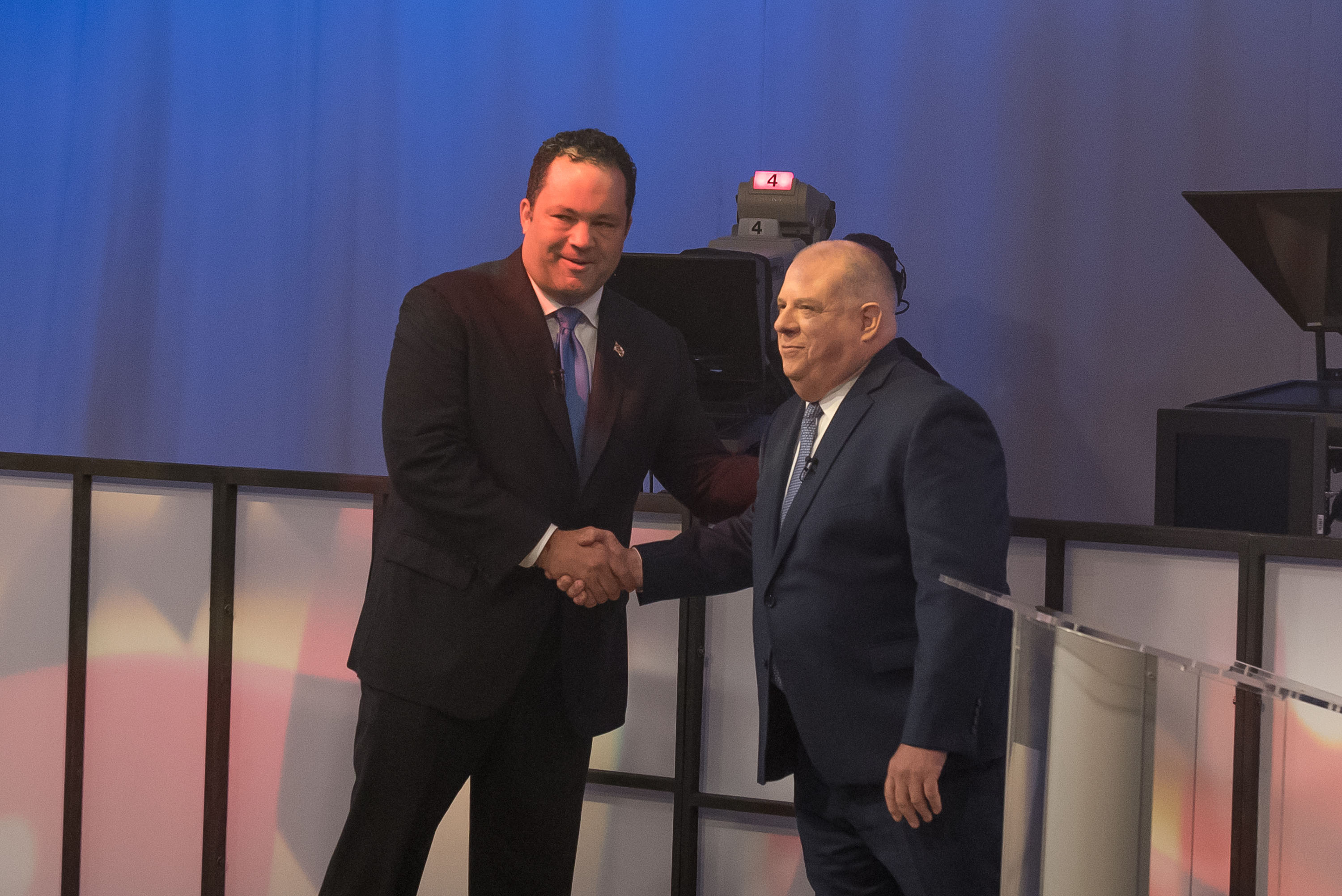Maryland Gov. Larry Hogan and Democratic nominee Ben Jealous sparred over the opioid crisis, gun violence and education in the first and only televised debate of the 2018 gubernatorial race Monday.
The candidates clashed throughout the debate, talking over one another and running over their time limits.
The fire reached a high point when Ryan Eldredge of WMDT asked the candidates how the state would pay for opioid treatment options or facilities. Between January and March of 2018, there were 579 opioid-related deaths in Maryland, according to the state’s health department.
[Read more: Former NAACP president Ben Jealous wins Democratic nomination for governor]
Jealous said that Hogan “ran for office saying this was an emergency,” but did not declare a state of emergency until 2017, two years after he took office. Jealous said he wants to sue pharmaceutical companies for causing “pain and havoc.”
Hogan noted that he appointed Lt. Gov. Boyd Rutherford to chair the Heroin and Opioid Emergency Task Force “immediately after becoming governor,” and that the state implemented the task force’s 36 recommendations and invested $600 million into treatment and facilities.
Hogan said Jealous was “using” the deaths of Marylanders.
“This is about families,” Jealous said. “And for you to sit here, sir, and suggest that’s about politics — this is about lives!”
“I know it’s about lives,” Hogan replied. “I’m the one that brought this issue to the forefront.”
[Read more: Larry Hogan announces new UMD research center for students with disabilities]
Sydney Poretsky, University of Maryland College Democrats president, said the opioid crisis is especially important for Maryland because it affects the lives of so many people.
“Both candidates did a very good job expressing the crisis and how important it is for Maryland to tackle this issue,” she said. “That was a conversation that really bettered my understanding of what [Jealous] would do as governor, and also just really further motivated me to vote for him.”
The sole debate comes after the Republican incumbent wanted two debates, and Jealous, the former NAACP president, wanted five. In 2014, Hogan and Democratic nominee Lt. Gov. Anthony Brown faced off in three televised debates, and in 2010, Martin O’Malley and Robert Ehrlich Jr. debated twice on television and once on radio, according to The Baltimore Sun.
Baltimore Sun reporter Pamela Wood noted that five people were killed in a June mass shooting at the Capital Gazette, an Annapolis-based paper owned by The Baltimore Sun Media Group, and prompted the candidates about what they intended to do to reduce gun violence.
Jealous touted his plan to combat the flow of illegal guns into Maryland, treat gun violence as a public health crisis and respond to mental health problems with more social workers and school psychologists.
“I’m oddly proud to receive an F rating from the NRA,” Jealous said.
Hogan pointed to his sponsorship of red-flag laws — which allow police or family members to request a court order when a person displays “red flags” indicating they could endanger themselves or others — and passing of “tough mandatory sentences on people who commit crimes with guns.”
The candidates also discussed education in the state, and a notable achievement gap. The National Center for Education Statistics defines the gap as when students — grouped by race, ethnicity or gender — outperform another group in average scores.
“The majority of children in our state are not proficient in reading, or writing, or math,” Jealous said.
Jealous said the best way to make strides in cutting the gap is to increase teacher pay 29 percent and implement universal, full-day pre-kindergarten funded by legalizing cannabis for adults.
Hogan took on a different tune. He cited the state’s record education funding — $25 billion over his four years in office, according to The Baltimore Sun.
“I believe very strongly that every single child in our state deserves access to a world-class education, regardless of what neighborhood they happen to grow up in, and that’s what we’ve been focused on for four years,” Hogan said.
Ben Colebrook, this university’s College Republicans president, said Hogan did an “excellent job” of outlining his successes as a governor. But he said one topic stood out because it wasn’t discussed: the Chesapeake Bay.
“The environment is a very important issue to a lot of Marylanders, especially the Chesapeake Bay,” said Colebrook, a junior mathematics and computer science major. “It’s so central to our economy and the lives of many, many Marylanders.”



